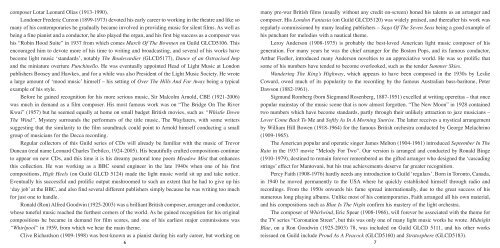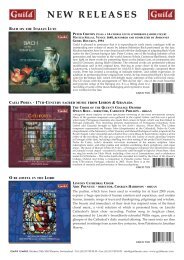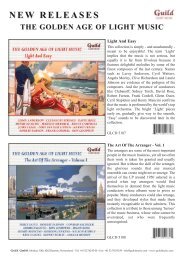Guild GmbH Switzerland
Guild GmbH Switzerland
Guild GmbH Switzerland
You also want an ePaper? Increase the reach of your titles
YUMPU automatically turns print PDFs into web optimized ePapers that Google loves.
composer Lotar Leonard Olias (1913-1990).<br />
Londoner Frederic Curzon (1899-1973) devoted his early career to working in the theatre and like so<br />
many of his contemporaries he gradually became involved in providing music for silent films. As well as<br />
being a fine pianist and a conductor, he also played the organ, and his first big success as a composer was<br />
his “Robin Hood Suite” in 1937 from which comes March Of The Bowmen on <strong>Guild</strong> GLCD5106. This<br />
encouraged him to devote more of his time to writing and broadcasting, and several of his works have<br />
become light music ‘standards’, notably The Boulevardier (GLCD5177), Dance of an Ostracised Imp<br />
and the miniature overture Punchinello. He was eventually appointed Head of Light Music at London<br />
publishers Boosey and Hawkes, and for a while was also President of the Light Music Society. He wrote<br />
a large amount of ‘mood music’ himself – his setting of Over The Hills And Far Away being a typical<br />
example of his style.<br />
Before he gained recognition for his more serious music, Sir Malcolm Arnold, CBE (1921-2006)<br />
was much in demand as a film composer. His most famous work was on “The Bridge On The River<br />
Kwai” (1957) but he seemed equally at home on small budget British movies, such as “Whistle Down<br />
The Wind”. Mystery surrounds the performers of the title music, The Wayfarers, with some writers<br />
suggesting that the similarity to the film soundtrack could point to Arnold himself conducting a small<br />
group of musicians for the Decca recording.<br />
Regular collectors of this <strong>Guild</strong> series of CDs will already be familiar with the music of Trevor<br />
Duncan (real name Leonard Charles Trebilco, 1924-2005). His beautifully crafted compositions continue<br />
to appear on new CDs, and this time it is his dreamy pastoral tone poem Meadow Mist that enhances<br />
this collection. He was working as a BBC sound engineer in the late 1940s when one of his first<br />
compositions, High Heels (on <strong>Guild</strong> GLCD 5124) made the light music world sit up and take notice.<br />
Eventually his successful and prolific output mushroomed to such an extent that he had to give up his<br />
‘day job’ at the BBC, and also find several different publishers simply because he was writing too much<br />
for just one to handle.<br />
Ronald (Ron) Alfred Goodwin (1925-2003) was a brilliant British composer, arranger and conductor,<br />
whose tuneful music reached the furthest corners of the world. As he gained recognition for his original<br />
compositions he became in demand for film scores, and one of his earliest major commissions was<br />
“Whirlpool” in 1959, from which we hear the main theme.<br />
many pre-war British films (usually without any credit on-screen) honed his talents as an arranger and<br />
composer. His London Fantasia (on <strong>Guild</strong> GLCD5120) was widely praised, and thereafter his work was<br />
regularly commissioned by many leading publishers – Saga Of The Seven Seas being a good example of<br />
his penchant for melodies with a nautical theme.<br />
Leroy Anderson (1908-1975) is probably the best-loved American light music composer of his<br />
generation. For many years he was the chief arranger for the Boston Pops, and its famous conductor,<br />
Arthur Fiedler, introduced many Anderson novelties to an appreciative world. He was so prolific that<br />
some of his numbers have tended to become overlooked, such as the tender Summer Skies.<br />
Wandering The King’s Highway, which appears to have been composed in the 1930s by Leslie<br />
Coward, owed much of its popularity to the recording by the famous Australian bass-baritone, Peter<br />
Dawson (1882-1961).<br />
Sigmund Romberg (born Siegmund Rosenberg, 1887-1951) excelled at writing operettas – that once<br />
popular mainstay of the music scene that is now almost forgotten. “The New Moon” in 1928 contained<br />
two numbers which have become standards, partly through their unlikely attraction to jazz musicians –<br />
Lover Come Back To Me and Softly As In A Morning Sunrise. The latter receives a mystical arrangement<br />
by William Hill Bowen (1918-1964) for the famous British orchestra conducted by George Melachrino<br />
(1909-1965).<br />
The American popular and operatic singer James Melton (1904-1961) introduced September In The<br />
Rain in the 1937 movie “Melody For Two”. Our version is arranged and conducted by Ronald Binge<br />
(1910-1979), destined to remain forever remembered as the gifted arranger who designed the ‘cascading<br />
strings’ effect for Mantovani, but his true achievements deserve far greater recognition.<br />
Percy Faith (1908-1976) hardly needs any introduction to <strong>Guild</strong> ‘regulars’. Born in Toronto, Canada,<br />
in 1940 he moved permanently to the USA where he quickly established himself through radio and<br />
recordings. From the 1950s onwards his fame spread internationally, due to the great success of his<br />
numerous long playing albums. Unlike most of his contemporaries, Faith arranged all his own material,<br />
and his compositions such as Blue Is The Night confirm his mastery of the light orchestra.<br />
The composer of Whirlwind, Eric Spear (1908-1966), will forever be associated with the theme for<br />
the TV series “Coronation Street”, but this was only one of many light music works he wrote. Midnight<br />
Blue, on a Ron Goodwin (1925-2003) 78, was included on <strong>Guild</strong> GLCD 5111, and his other works<br />
Clive Richardson (1909-1998) was best-known as a pianist during his early career, but working on reissued on <strong>Guild</strong> include Proud As A Peacock (GLCD5160) and Stratosphere (GLCD5183).<br />
6 7
















